Features
EXPLORING SOUTH EAST ENGLAND – Part 50

CONFESSIONS OF A GLOBAL GYPSY
By Dr. Chandana (Chandi) Jayawardena DPhil
President – Chandi J. Associates Inc. Consulting, Canada
Founder & Administrator – Global Hospitality Forum
chandij@sympatico.ca
After returning from Scotland, I had two leisure days in London with my wife. Early morning on a Monday in late February, 1982, my United Nations (UN)/International Labour Organization (ILO) Fellowship Coordinator for the United Kingdom (UK), Larry Wilson, drove me to a small town, Cosham, in South East England. My one month stay there opened many doors for me to explore this beautiful region.
Today, the South East is the third largest region out of nine official regions of England (in 1982, known as the government office regions). The South East region consists of nine counties of Buckinghamshire, Oxfordshire, Berkshire, Hampshire, Surrey, Kent, East Sussex, West Sussex, and the Isle of Wight. I eventually visited 20 cities in this region.
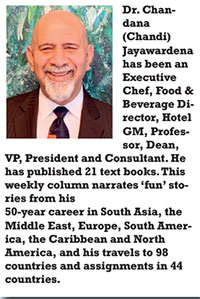
Cosham
I lived in Cosham for a month while travelling across the region. Cosham is a northern suburb of Portsmouth lying within the city boundary but off Portsea Island. Its population in 1982 was around 10,000. I enjoyed going for long walks in a friendly neighbourhood. There were no significant tourist attractions there. However, I was happy to experience living with a local English family. All members of this young family were very friendly.
Every week day, they prepared a heavy English breakfast for me, and the family sat with me for supper around 6:00 pm. After that on most evenings, I played pranks on their two young children and their dog which amused the young parents. “Chandi, shall we watch some telly”, the parents usually invited me while switching to BBC Channel One to watch the TV news in the evening. Some other families in Cosham with a room or two to spare, also made a little extra income by accommodating international students from the nearby Highbury College of Technology.
Highbury College
The Highbury College’s new facility for Hotel & Catering programs was opened just before my arrival. At the College I was mentored by Freddy Watts, a Senior Lecturer in Food & Beverage Operations. I shadowed Freddy in all of his theory classes and practical sessions. He demonstrated to me how efficiently he ran the training bar while teaching his students to make over 60 most popular cocktails in the world, something I followed when I returned to Ceylon Hotel School to teach Bar Theory and Cocktail Making Practical Demonstrations.
Towards the end of my one month at Highbury College, I was invited to deliver a few guest lectures. I happily used that opportunity to practice my newly acquired teaching skills from the Turin Centre in Italy. When I asked Freddy one day, which were the best universities or colleges in UK to study hotel management, Freddy said, “The best is the University of Surrey. Then comes Ealing College, and the Westminster College, which is the oldest. Highbury College is now coming closer to those top three.”
Portsmouth
I became a regular evening visitor to the nearby historic city Portsmouth. It was one of the most densely populated cities in UK. Portsmouth is mostly located on Portsea Island. As one of the world’s best-known ports, Portsmouth’s history can be traced to Roman times and has been a significant Royal Navy dockyard and base for centuries. Portsmouth has the world’s oldest dry dock, ‘The Great Stone Dock’, originally built in 1698.
By the early-19th century, Portsmouth was the most heavily fortified city in the world, and was considered ‘the world’s greatest naval port’ at the height of the British Empire. By the mid-19th century, a ring of defensive land and sea forts, known as the Palmerston Forts had been built around Portsmouth in anticipation of an invasion from Continental Europe. I found the history of Portsmouth fascinating.
HMS Victory and Lord Nelson
I became interested in one of the greatest British heroes of all time – Admiral Horatio Nelson (Lord Nelson). It stemmed from my frequent visits in and around the Trafalgar Square by foot and London buses in 1979 and 1982. Looking up at the most impressive 169 feet tall Nelson’s Column fired my curiosity about this legendary hero, who had injured one eye and lost one arm in two different battles.
Lord Nelson supposedly had popularized the term: ‘turned a blind eye’ when wilfully disobeying a signal from a superior to withdraw his ship during a naval engagement. His inspirational leadership, visionary strategy and unconventional tactics brought about a number of significant British naval victories during the French Revolutionary and Napoleonic Wars.
He is widely regarded as one of the greatest naval commanders in history. The Battle of Trafalgar in 1805 was one of the most decisive naval battles in history, when a British fleet under the command of Lord Nelson defeated a combined French and Spanish fleet off the coast of Spain. Lord Nelson died on his flagship, HMS Victory at the end of the Battle of Trafalgar.
As the legend has it, fatally wounded Lord Nelson, asked, “Did Britain win?” According to the tour guide who took me to Lord Nelson’s cabin on HMS Victory, after hearing the good news, Lord Nelson gave his final order, “Bury me in England” and took his final breath. As the voyage back to Portsmouth would have taken a several days, naval officers arranged to have Lord Nelson’s body placed in a cask filled with brandy and rum.
Upon arrival at Portsmouth, however, the story goes that when the cask was opened it was empty of any liquor. The pickled body was then removed. Upon inspection, it was discovered that the a few liquor-addicted sailors had drilled a hole in the bottom of the cask and drunk all the brandy and rum. “Now you understand how the popular term – ‘Full Bodied Wine’ originated!” our guide joked.
I liked watching famous movies about Lord Nelson such as ‘Bequest to the Nation/The Nelson Affair’ (with Peter Finch as Lord Nelson and Glenda Jackson as his mistress – Lady Hamilton). When I lived in the West Indies/the Caribbean for nearly a decade from the early 1990s, my museum visits sparked further interest about this legendary character. During Lord Nelson’s near-decade long early period of naval duty in the Caribbean, he left records and myths about both his professional life and personal life, including affairs and slave ownership.
After serving in and around Port Royal, Jamaica (which was my second home), Lord Nelson had been transferred to the islands of Antigua and Barbuda. In his late twenties he commanded this important (due to its close proximity to the islands of the French West Indies), naval base within the English Harbour. The base is named after its most famous resident, as ‘Nelson’s Dockyard’, which is now a UNESCO World Heritage Site.
Currently, his former residence, is an expensive 10-bedroom boutique hotel with an amazing historical charm – Admiral’s Inn. In the year 2000, during an official trip for my then employer, the University of the West Indies, I did a special trip to the English Harbour and managed to stay for one night in the bedroom used by Lord Nelson. During my travels in 26 Caribbean countries, this stay was one of the most memorable.
South Downs
“Chandi, get ready to move from Cosham to South Downs for a few days. I have arranged a special management observer period for you at a Holiday Inn in that area”, Larry Wilson told me over the telephone. Arriving in South Downs in Larry’s car, I could not take my eyes off a range of chalk hills that extends over many counties with steep escarpment on one side. The South Downs are characterised by rolling chalk downland with close-cropped (by the sheep) turf and dry valleys, and are recognised as one of the most important chalk landscapes in England.
The South Downs are relatively less populated compared to South East England as a whole. There is a rich heritage of historical features and archaeological remains, including defensive sites, burial mounds and field boundaries. The downland is a highly popular recreational destination, particularly for walkers, horse riders and mountain bikers.
My observer period at the Holiday Inn focused mainly on training new food and beverage servers. Developed by their corporate offices, the on-the-job training sessions covered the very basics of customer service in a most effective manner. Having recently completed a training program at the ILO head office in Switzerland on ‘Modules of Employable Skills’, my role at the Holiday Inn quickly changed from a mere observer to a facilitator.
This new experience was helpful to me when, one year later, as a consultant, I developed a two-week food and beverage training session for hotel workers in Sri Lanka. This was on the invitation of my friend, Imtiaz Cader, the General Manager/Director of the Holiday Inn in Colombo.
Winchester
I was happy to receive an invitation from a family friend, Mary Anderson to spend a couple of days at her house in Winchester. In 1980, Mary travelled to Sri Lanka to attend our wedding. Mary came with her granddaughter Sarah to pick me up from the coach station and took me on a long tour covering many tourist spots of their historic city.
Winchester is a city on the edge of South Downs National Park. Mary took great pride in taking me to see the medieval Winchester Cathedral. The Great Hall of Winchester Castle houses the medieval round table linked to the mythological figure, King Arthur who was the head of the Kingdom Camelot and the Knights of the Round Table.
“I am too old to do the long Keats’ walk by the River Itchen. Sarah, you go with Chandi”. Mary sat down to rest with a cup of tea. After a beautiful walk passing the famous city mill and shop, Sarah took me along the Water Meadows Alms-houses (bede-houses) established from the 10th century to provide a place of residence for poor, old and distressed people. The oldest Alms-house still in existence is the Hospital of St. Cross in Winchester, built around 1,000 years ago.
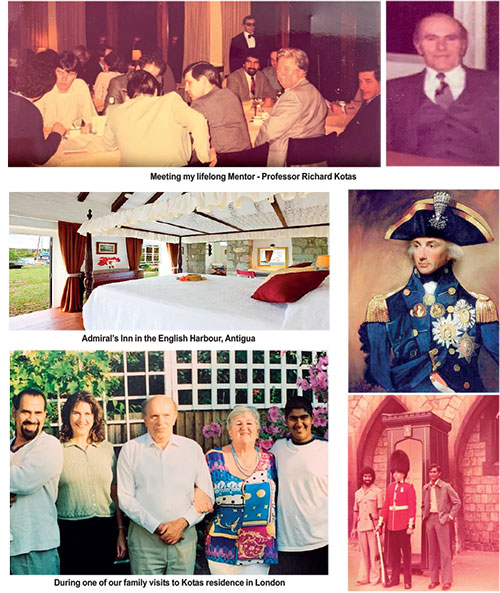
Windsor
A friend of mine from London drove me to Windsor, which is a town on the River Thames, just west of London. It is the home to Windsor Castle, a residence of the British Royal Family. Built by William the Conqueror in the 11th century, the castle was extensively remodelled by subsequent monarchs. We took part in a guided public tour.
St George’s Chapel at Windsor Castle built in the late-medieval Perpendicular Gothic style. It was built in the 14th century by King Edward III and extensively enlarged in the late 15th century. It is located in the Lower Ward of the castle. The chapel has been the scene of many royal services, weddings and burials, over the centuries.
Guildford
UN/ILO arranged for my final week in UK to be in Guildford. I found the medieval Guildford Castle, in the centre of town to be very impressive. The immaculately landscaped gardens and views from its square tower were beautiful. I enjoyed a visit to Loseley Park, a large a 16th-century Tudor manor house with a walled garden. As an artist, I was particularly interested in visiting the nearby Watts Gallery, and Artists’ Village, which displayed Victorian paintings and sculptures.
In the later years, I visited a few other cities in South East England, including Canterbury, Tunbridge Wells, Folkstone, Eastbourne, Brighton, Southampton, Bournemouth, Torque, Plymouth; for leisure, work or research.
University of Surrey
I then moved to Guildford for a week. My accommodation was in the student residence of the University of Surrey. It is a public research university which had received its royal charter in 1966, along with a number of other institutions previously known as colleges of technology. Over the years, the university’s research output and global partnerships have led to it being regarded as one of UK’s leading research universities.
In March, 1982, I attended a week-long management development program there, designed for middle managers of the British hotel industry. Our program focused on hotel design, marketing, finance, and food and beverage controls. I was the only international attendee of this program.
During the management development program, we had our lunches and dinners at the training restaurant of the Department of Tourism and Hotel Management of the University of Surrey. Each table for dinner was hosted by one of the professors or a senior lecturer. Around mid-week, at the dinner table where I was seated, there was no host, but a vacant chair next to me. Just before the service began, a middle-aged gentleman sat at that chair and started a friendly conversation with me. That chat changed and influenced my professional life significantly, over many decades.
“I am Richard Kotas. Where do you come from?” the gentleman asked me soon after sitting at the head of the table. During the discussion over dinner, we learnt a lot about each other. I was very impressed about his life story. After leaving a labour camp in the Nazi Germany after World War II, Richard Kotas arrived in UK as a refugee. His whole family in Poland, was sadly displaced. “All I had was my father’s wristwatch, five British pounds and the ability to speak about five words in English,” he old me explaining his humble beginnings in a new country.

In 1982, Richard Kotas was a highly respected Senior Lecturer and author who had published over a dozen text books related to hotel finance and accounting. He then gave me a signed copy of a very popular textbook titled, ‘Food and Beverage Control’ which he had co-authored. “This is for you Chandi. I will discuss this book, cover to cover, over the next two days with your group”, he said with a friendly hand shake.
Twelve years after that dinner meeting, Richard Kotas and I co-authored a British text book which became popular in many universities in the Commonwealth. It was based on my master’s degree dissertation, which he supervised in 1984. I got into writing and editing text books, mainly due to the encouragement and coaching by Richard Kotas, over the years.
Over that dinner in March 1982, Richard Kotas informed me that, the world’s first master’s degree in International Hotel Management will commence at the University of Surrey in September 1983, with him as the Program Coordinator. “You would be a good candidate for this master’s degree”, he encouraged me, and I immediately said, “Yes!”. The very next day, he arranged an appointment for me to be interviewed by his Head of Department.
Unfortunately, I was rejected by Professor Philip Nailon, Head of the Department of Tourism and Hotel Management, as I did not have the entry qualification of a four-year honour’s bachelor’s degree. Rejection always was a motivator for me, and I continued to pursue then possibilities. “Your credentials are impressive and we are happy to enrol you in the fourth year of our bachelor’s degree, before joining the master’s degree.”
After checking the program fees, I realised that I simply could not invest the money for two years of studies in UK. “There must be some other way for me to bridge the gap and join the first cohort of the master’s degree” I gently pushed towards achieving my objective. Professor Nailon then said, “OK. When you return to Sri Lanka, look for reputed university programs equivalent to the fourth-year level academic studies, and let me know if you find something good for me to re-consider your application to the MSc in International Hotel Management.” I was certainly determined to do so.
According to Professor Richard Kotas, I was his best student in 1983/84 during my master’s degree studies at the University of Surrey. He was my favourite teacher of all time. Later, he became my boss, co-author, co-presenter of seminars, business partner, fellow board member, lifelong mentor and more importantly; loyal friend. Over the years, we did joint-assignments in UK, Sri Lanka and Jamaica. In 1990, when he was the Director of the School of Hotel Management at Schiller International University in London, he hired me as his deputy.
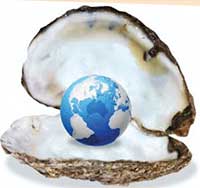
Professor and Mrs. Kotas were like my parents and they also loved my wife, like the daughter they never had. Over 38 years, every time I was in West London, I visited Professor and Mrs. Kotas and had a home-cooked Polish meal in their home. The last time I did so was in January 2020, when I spent six hours with them, on my way from Toronto to Colombo.
During that meeting, we compared fruits of our new mutual hobby – poetry. He gave me signed copies of his two latest books, with his poems. I read some of my new poems and sought Professor Kotas’s input. “My dear Chandi, your poetry is beautiful. You must publish a book of poetry”, he planted a seed in my mind. He never saw my book of poetry, ‘Emotions’ which was published in 2022. Professor Kotas passed away a few months after my final meeting with him in London in 2020, when he had just turned 91. RIP, my dear friend! Thank you for everything! I love you.
Features
Lasting solutions require consensus
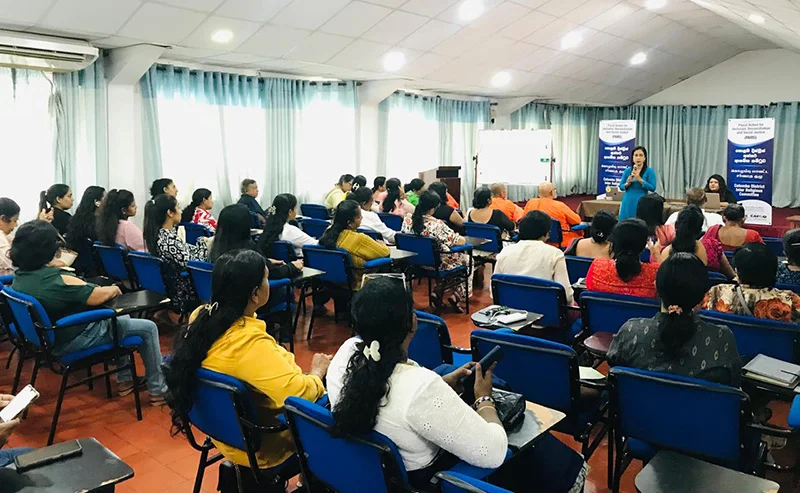
Problems and solutions in plural societies like Sri Lanka’s which have deep rooted ethnic, religious and linguistic cleavages require a consciously inclusive approach. A major challenge for any government in Sri Lanka is to correctly identify the problems faced by different groups with strong identities and find solutions to them. The durability of democratic systems in divided societies depends less on electoral victories than on institutionalised inclusion, consultation, and negotiated compromise. When problems are defined only through the lens of a single political formation, even one that enjoys a large electoral mandate, such as obtained by the NPP government, the policy prescriptions derived from that diagnosis will likely overlook the experiences of communities that may remain outside the ruling party. The result could end up being resistance to those policies, uneven implementation and eventual political backlash.
A recent survey done by the National Peace Council (NPC), in Jaffna, in the North, at a focus group discussion for young people on citizen perception in the electoral process, revealed interesting developments. The results of the NPC micro survey support the findings of the national survey by Verite Research that found that government approval rating stood at 65 percent in early February 2026. A majority of the respondents in Jaffna affirm that they feel safer and more fairly treated than in the past. There is a clear improving trend to be seen in some areas, but not in all. This survey of predominantly young and educated respondents shows 78 percent saying livelihood has improved and an equal percentage feeling safe in daily life. 75 percent express satisfaction with the new government and 64 percent believe the state treats their language and culture fairly. These are not insignificant gains in a region that bore the brunt of three decades of war.
Yet the same survey reveals deep reservations that temper this optimism. Only 25 percent are satisfied with the handling of past issues. An equal percentage see no change in land and military related concerns. Most strikingly, almost 90 percent are worried about land being taken without consent for religious purposes. A significant number are uncertain whether the future will be better. These negative sentiments cannot be brushed aside as marginal. They point to unresolved structural questions relating to land rights, demilitarisation, accountability and the locus of political power. If these issues are not addressed sooner rather than later, the current stability may prove fragile. This suggests the need to build consensus with other parties to ensure long-term stability and legitimacy, and the need for partnership to address national issues.
NPP Absence
National or local level problems solving is unlikely to be successful in the longer term if it only proceeds from the thinking of one group of people even if they are the most enlightened. Problem solving requires the engagement of those from different ethno-religious, caste and political backgrounds to get a diversity of ideas and possible solutions. It does not mean getting corrupted or having to give up the good for the worse. It means testing ideas in the public sphere. Legitimacy flows not merely from winning elections but from the quality of public reasoning that precedes decision-making. The experience of successful post-conflict societies shows that long term peace and development are built through dialogue platforms where civil society organisations, political actors, business communities, and local representatives jointly define problems before negotiating policy responses.
As a civil society organisation, the National Peace Council engages in a variety of public activities that focus on awareness and relationship building across communities. Participants in those activities include community leaders, religious clergy, local level government officials and grassroots political party representatives. However, along with other civil society organisations, NPC has been finding it difficult to get the participation of members of the NPP at those events. The excuse given for the absence of ruling party members is that they are too busy as they are involved in a plenitude of activities. The question is whether the ruling party members have too much on their plate or whether it is due to a reluctance to work with others.
The general belief is that those from the ruling party need to get special permission from the party hierarchy for activities organised by groups not under their control. The reluctance of the ruling party to permit its members to join the activities of other organisations may be the concern that they will get ideas that are different from those held by the party leadership. The concern may be that these different ideas will either corrupt the ruling party members or cause dissent within the ranks of the ruling party. But lasting reform in a plural society requires precisely this exposure. If 90 percent of surveyed youth in Jaffna are worried about land issues, then engaging them, rather than shielding party representatives from uncomfortable conversations, is essential for accurate problem identification.
North Star
The Leader of the Lanka Sama Samaja Party (LSSP), Prof Tissa Vitarana, who passed away last week, gave the example for national level problem solving. As a government minister he took on the challenge the protracted ethnic conflict that led to three decades of war. He set his mind on the solution and engaged with all but never veered from his conviction about what the solution would be. This was the North Star to him, said his son to me at his funeral, the direction to which the Compass (Malimawa) pointed at all times. Prof Vitarana held the view that in a diverse and plural society there was a need to devolve power and share power in a structured way between the majority community and minority communities. His example illustrates that engagement does not require ideological capitulation. It requires clarity of purpose combined with openness to dialogue.
The ethnic and religious peace that prevails today owes much to the efforts of people like Prof Vitarana and other like-minded persons and groups which, for many years, engaged as underdogs with those who were more powerful. The commitment to equality of citizenship, non-racism, non-extremism and non-discrimination, upheld by the present government, comes from this foundation. But the NPC survey suggests that symbolic recognition and improved daily safety are not enough. Respondents prioritise personal safety, truth regarding missing persons, return of land, language use and reduction of military involvement. They are also asking for jobs after graduation, local economic opportunity, protection of property rights, and tangible improvements that allow them to remain in Jaffna rather than migrate.
If solutions are to be lasting they cannot be unilaterally imposed by one party on the others. Lasting solutions cannot be unilateral solutions. They must emerge from a shared diagnosis of the country’s deepest problems and from a willingness to address the negative sentiments that persist beneath the surface of cautious optimism. Only then can progress be secured against reversal and anchored in the consent of the wider polity. Engaging with the opposition can help mitigate the hyper-confrontational and divisive political culture of the past. This means that the ruling party needs to consider not only how to protect its existing members by cloistering them from those who think differently but also expand its vision and membership by convincing others to join them in problem solving at multiple levels. This requires engagement and not avoidance or withdrawal.
by Jehan Perera
Features
Unpacking public responses to educational reforms
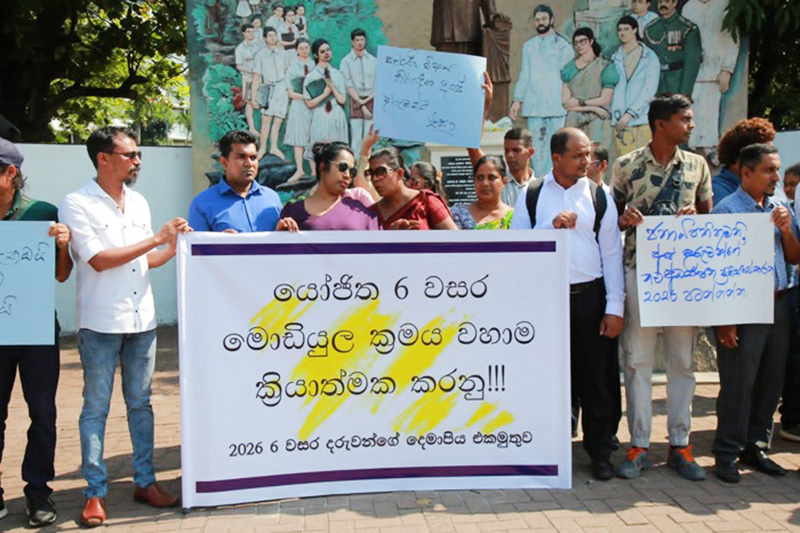
 As the debate on educational reforms rages, I find it useful to pay as much attention to the reactions they have excited as we do to the content of the reforms. Such reactions are a reflection of how education is understood in our society, and this understanding – along with the priorities it gives rise to – must necessarily be taken into account in education policy, including and especially reform. My aim in this piece, however, is to couple this public engagement with critical reflection on the historical-structural realities that structure our possibilities in the global market, and briefly discuss the role of academics in this endeavour.
As the debate on educational reforms rages, I find it useful to pay as much attention to the reactions they have excited as we do to the content of the reforms. Such reactions are a reflection of how education is understood in our society, and this understanding – along with the priorities it gives rise to – must necessarily be taken into account in education policy, including and especially reform. My aim in this piece, however, is to couple this public engagement with critical reflection on the historical-structural realities that structure our possibilities in the global market, and briefly discuss the role of academics in this endeavour.
Two broad reactions
The reactions to the proposed reforms can be broadly categorised into ‘pro’ and ‘anti’. I will discuss the latter first. Most of the backlash against the reforms seems to be directed at the issue of a gay dating site, accidentally being linked to the Grade 6 English module. While the importance of rigour cannot be overstated in such a process, the sheer volume of the energies concentrated on this is also indicative of how hopelessly homophobic our society is, especially its educators, including those in trade unions. These dispositions are a crucial part of the reason why educational reforms are needed in the first place. If only there was a fraction of the interest in ‘keeping up with the rest of the world’ in terms of IT, skills, and so on, in this area as well!
Then there is the opposition mounted by teachers’ trade unions and others about the process of the reforms not being very democratic, which I (and many others in higher education, as evidenced by a recent statement, available at https://island.lk/general-educational-reforms-to-what-purpose-a-statement-by-state-university-teachers/ ) fully agree with. But I earnestly hope the conversation is not usurped by those wanting to promote heteronormativity, further entrenching bigotry only education itself can save us from. With this important qualification, I, too, believe the government should open up the reform process to the public, rather than just ‘informing’ them of it.
It is unclear both as to why the process had to be behind closed doors, as well as why the government seems to be in a hurry to push the reforms through. Considering other recent developments, like the continued extension of emergency rule, tabling of the Protection of the State from Terrorism Act (PSTA), and proposing a new Authority for the protection of the Central Highlands (as is famously known, Authorities directly come under the Executive, and, therefore, further strengthen the Presidency; a reasonable question would be as to why the existing apparatus cannot be strengthened for this purpose), this appears especially suspect.
Further, according to the Secretary to the MOE Nalaka Kaluwewa: “The full framework for the [education] reforms was already in place [when the Dissanayake government took office]” (https://www.wsws.org/en/articles/2025/08/12/wxua-a12.html, citing The Morning, July 29). Given the ideological inclinations of the former Wickremesinghe government and the IMF negotiations taking place at the time, the continuation of education reforms, initiated in such a context with very little modification, leaves little doubt as to their intent: to facilitate the churning out of cheap labour for the global market (with very little cushioning from external shocks and reproducing global inequalities), while raising enough revenue in the process to service debt.
This process privileges STEM subjects, which are “considered to contribute to higher levels of ‘employability’ among their graduates … With their emphasis on transferable skills and demonstrable competency levels, STEM subjects provide tools that are well suited for the abstraction of labour required by capitalism, particularly at the global level where comparability across a wide array of labour markets matters more than ever before” (my own previous piece in this column on 29 October 2024). Humanities and Social Sciences (HSS) subjects are deprioritised as a result. However, the wisdom of an education policy that is solely focused on responding to the global market has been questioned in this column and elsewhere, both because the global market has no reason to prioritise our needs as well as because such an orientation comes at the cost of a strategy for improving the conditions within Sri Lanka, in all sectors. This is why we need a more emancipatory vision for education geared towards building a fairer society domestically where the fruits of prosperity are enjoyed by all.
The second broad reaction to the reforms is to earnestly embrace them. The reasons behind this need to be taken seriously, although it echoes the mantra of the global market. According to one parent participating in a protest against the halting of the reform process: “The world is moving forward with new inventions and technology, but here in Sri Lanka, our children are still burdened with outdated methods. Opposition politicians send their children to international schools or abroad, while ours depend on free education. Stopping these reforms is the lowest act I’ve seen as a mother” (https://www.newsfirst.lk/2026/01/17/pro-educational-reforms-protests-spread-across-sri-lanka). While it is worth mentioning that it is not only the opposition, nor in fact only politicians, who send their children to international schools and abroad, the point holds. Updating the curriculum to reflect the changing needs of a society will invariably strengthen the case for free education. However, as mentioned before, if not combined with a vision for harnessing education’s emancipatory potential for the country, such a move would simply translate into one of integrating Sri Lanka to the world market to produce cheap labour for the colonial and neocolonial masters.
According to another parent in a similar protest: “Our children were excited about lighter schoolbags and a better future. Now they are left in despair” (https://www.newsfirst.lk/2026/01/17/pro-educational-reforms-protests-spread-across-sri-lanka). Again, a valid concern, but one that seems to be completely buying into the rhetoric of the government. As many pieces in this column have already shown, even though the structure of assessments will shift from exam-heavy to more interim forms of assessment (which is very welcome), the number of modules/subjects will actually increase, pushing a greater, not lesser, workload on students.
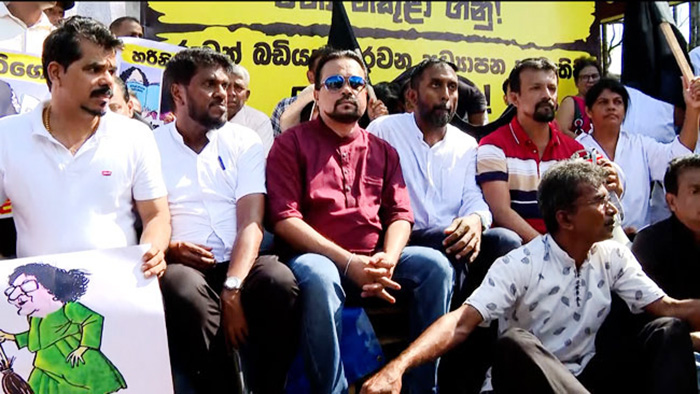
A file photo of a satyagraha against education reforms
What kind of education?
The ‘pro’ reactions outlined above stem from valid concerns, and, therefore, need to be taken seriously. Relatedly, we have to keep in mind that opening the process up to public engagement will not necessarily result in some of the outcomes, those particularly in the HSS academic community, would like to see, such as increasing the HSS component in the syllabus, changing weightages assigned to such subjects, reintroducing them to the basket of mandatory subjects, etc., because of the increasing traction of STEM subjects as a surer way to lock in a good future income.
Academics do have a role to play here, though: 1) actively engage with various groups of people to understand their rationales behind supporting or opposing the reforms; 2) reflect on how such preferences are constituted, and what they in turn contribute towards constituting (including the global and local patterns of accumulation and structures of oppression they perpetuate); 3) bring these reflections back into further conversations, enabling a mutually conditioning exchange; 4) collectively work out a plan for reforming education based on the above, preferably in an arrangement that directly informs policy. A reform process informed by such a dialectical exchange, and a system of education based on the results of these reflections, will have greater substantive value while also responding to the changing times.
Two important prerequisites for this kind of endeavour to succeed are that first, academics participate, irrespective of whether they publicly endorsed this government or not, and second, that the government responds with humility and accountability, without denial and shifting the blame on to individuals. While we cannot help the second, we can start with the first.
Conclusion
For a government that came into power riding the wave of ‘system change’, it is perhaps more important than for any other government that these reforms are done for the right reasons, not to mention following the right methods (of consultation and deliberation). For instance, developing soft skills or incorporating vocational education to the curriculum could be done either in a way that reproduces Sri Lanka’s marginality in the global economic order (which is ‘system preservation’), or lays the groundwork to develop a workforce first and foremost for the country, limited as this approach may be. An inextricable concern is what is denoted by ‘the country’ here: a few affluent groups, a majority ethno-religious category, or everyone living here? How we define ‘the country’ will centrally influence how education policy (among others) will be formulated, just as much as the quality of education influences how we – students, teachers, parents, policymakers, bureaucrats, ‘experts’ – think about such categories. That is precisely why more thought should go to education policymaking than perhaps any other sector.
(Hasini Lecamwasam is attached to the Department of Political Science, University of Peradeniya).
Kuppi is a politics and pedagogy happening on the margins of the lecture hall that parodies, subverts, and simultaneously reaffirms social hierarchies.
Features
Chef’s daughter cooking up a storm…
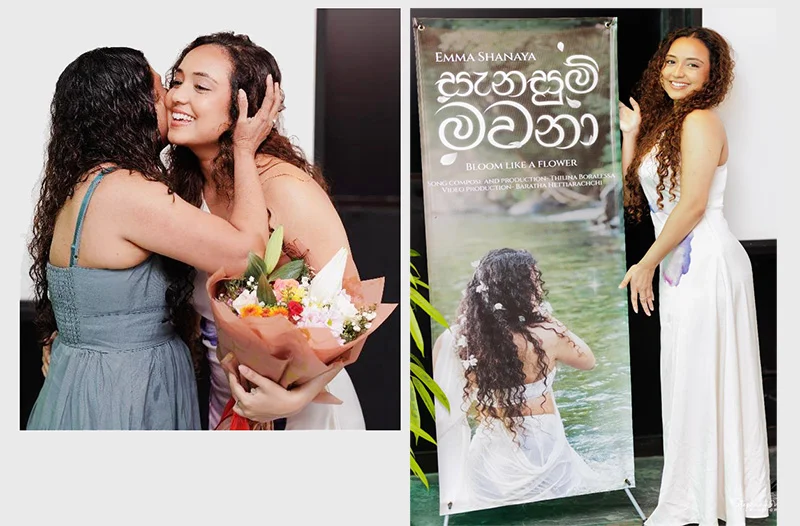
 Don Sherman was quite a popular figure in the entertainment scene but now he is better known as the Singing Chef and that’s because he turns out some yummy dishes at his restaurant, in Rajagiriya.
Don Sherman was quite a popular figure in the entertainment scene but now he is better known as the Singing Chef and that’s because he turns out some yummy dishes at his restaurant, in Rajagiriya.
However, now the spotlight is gradually focusing on his daughter Emma Shanaya who has turned out to be a very talented singer.
In fact, we have spotlighted her in The Island a couple of times and she is in the limelight, once gain.
When Emma released her debut music video, titled ‘You Made Me Feel,’ the feedback was very encouraging and at that point in time she said “I only want to keep doing bigger and greater things and ‘You Made Me Feel’ is the very first step to a long journey.”
Emma, who resides in Melbourne, Australia, is in Sri Lanka, at the moment, and has released her very first Sinhala single.
“I’m back in Sri Lanka with a brand new single and this time it’s a Sinhalese song … yes, my debut Sinhala song ‘Sanasum Mawana’ (Bloom like a Flower).
“This song is very special to me as I wrote the lyrics in English and then got it translated and re-written by my mother, and my amazing and very talented producer Thilina Boralessa. Thilina also composed the music, and mix and master of the track.”
Emma went on to say that instead of a love song, or a young romance, she wanted to give the Sri Lankan audience a debut song with some meaning and substance that will portray her, not only as an artiste, but as the person she is.
Says Emma: “‘Sanasum Mawana’ is about life, love and the essence of a woman. This song is for the special woman in your life, whether it be your mother, sister, friend, daughter or partner. I personally dedicate this song to my mother. I wouldn’t be where I am right now if it weren’t for her.”
On Friday, 30th January, ‘Sanasum Mawana’ went live on YouTube and all streaming platforms, and just before it went live, she went on to say, they had a wonderful and intimate launch event at her father’s institute/ restaurant, the ‘Don Sherman Institute’ in Rajagiriya.
It was an evening of celebration, good food and great vibes and the event was also an introduction to Emma Shanaya the person and artiste.
Emma also mentioned that she is Sri Lanka for an extended period – a “work holiday”.
“I would like to expand my creativity in Sri Lanka and see the opportunities the island has in store for me. I look forward to singing, modelling, and acting opportunities, and to work with some wonderful people.
“Thank you to everyone that is by my side, supporting me on this new and exciting journey. I can’t wait to bring you more and continue to bloom like a flower.”
-

 Life style3 days ago
Life style3 days agoMarriot new GM Suranga
-

 Business2 days ago
Business2 days agoMinistry of Brands to launch Sri Lanka’s first off-price retail destination
-

 Features3 days ago
Features3 days agoMonks’ march, in America and Sri Lanka
-

 Midweek Review6 days ago
Midweek Review6 days agoA question of national pride
-

 Business6 days ago
Business6 days agoAutodoc 360 relocates to reinforce commitment to premium auto care
-

 Opinion5 days ago
Opinion5 days agoWill computers ever be intelligent?
-

 Features3 days ago
Features3 days agoThe Rise of Takaichi
-

 Features3 days ago
Features3 days agoWetlands of Sri Lanka:













